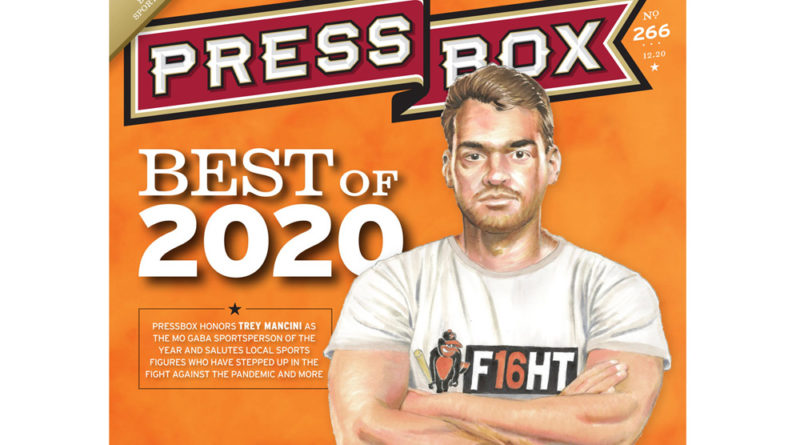When we lose someone, we often say things like, “We will carry their legacy with us forever.” We perhaps believe the person was so impactful that we aren’t capable of living any sort of normal life without still feeling his or her presence. But this must be more than lip service. When someone dies, those who cared about the person have an obligation to remain caretakers for his or her legacy.
Beginning this year and with the blessing of his mother Sonsy, PressBox has renamed our highest annual honor after our 2019 Sportsperson of the Year. The award will now be known as the “Mo Gaba Sportsperson of the Year.” We hope it will give reason for readers in future years to discover or remind themselves of one of the most special individuals our community has ever known.
We have often used the term “strong” as a rallying cry for those who are fighting cancer. But the term used for Trey Mancini’s battle with colon cancer was “fight” — stylized as “F16HT,” of course. No term could possibly be more appropriate for 2020. In this “Best Of” issue we are recognizing those who have helped in the fight against the COVID-19 pandemic and the ongoing fight for social justice. This has been a year for fighters.
Mancini had already embraced his role as both clubhouse leader and “face of the franchise” for the Baltimore Orioles after the departure of Adam Jones in 2018. But this year he was in the vulnerable position of also having to publicly fight cancer, winning his battle with true dignity. His care for our community was never more evident than in his close relationship with Mo, whom he managed to visit again this summer despite being in the throes of his own bout with cancer.
“I couldn’t think of a better compliment and honor than being the first person to receive this award after it was named after Mo and to receive the same award that Mo received a year ago,” Mancini said. “I’m humbled. I feel like I don’t deserve that honor. But I could not be more happy and honored to receive this award. I appreciate you guys. I appreciate everybody in Baltimore for rallying around me this year and for all the support.”
PressBox is proud to announce Trey Mancini as our first ever “Mo Gaba Sportsperson of the Year.” Mancini joined Stan Charles and Glenn Clark in the fall for a conversation about his “F16HT.”
This interview has been edited for content and clarity.
PressBox: Last March, what was your immediate reaction when you got the news that you had this tumor?
Trey Mancini: I was shocked. I was just waking up from anesthesia. The doctor that did my colonoscopy had started listing things that it wasn’t. Stomach ulcer and celiac disease were the two things we thought it was the most. He had listed those couple things and told me that it wasn’t either of those and kept telling me what he was doing, and the only thing left for him to say was that he found a tumor in my colon. Even before he said it, I kind of had a feeling he was going to say what he ended up saying. It was a shock. Up to that point, I hadn’t really heard of many young people getting colon cancer, so that’s why I didn’t really think it was much of a possibility. It’s always seen as a disease that the older population gets. So I was shocked, and I didn’t really know what it meant at that point just because there’s a tumor in you, but you don’t know if it’s spread anywhere or anything like that. That thought kind of goes in your head, too.
PB: When you find out and you’re in shock, what did your response turn into? Did it turn into anger? When did it turn into, “How are we going to beat this thing?”
TM: I accepted it as reality immediately. I wasn’t really angry. I was more just surprised, and then at that point I was just more anxious than anything about the surgery. I’d know after the surgery whether I had to do chemo or not, so I was more just focused on that, just kind of hoping it was stage 2 or something and they could do the surgery and just take it out and that would be it. So at that point, I was just holding out hope that that was the case. And no, I wasn’t really angry or anything like that. There was no use to be. It was reality, and I just kind of had to face it — tough luck, and you’ve just got to wear it. It’s not easy, but that’s the reality of it.
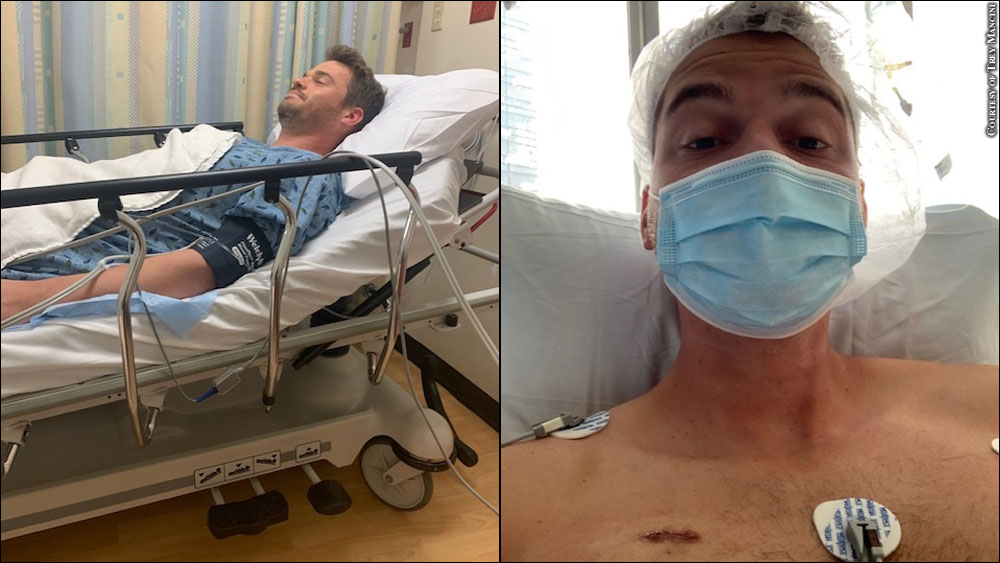
PB: Was there any fear? Did you go through any of that type of feeling of, “What if this is really bad?”
TM: Definitely. Luckily, I didn’t really know much, like what the CAT scan was going to say, but it was pretty big news that it came back and said it was contained to my colon area and hadn’t spread to any of my other organs around it. That was really good news, so I guess if there was any relief that day, that was it. But no, you really go into fight-or-flight mode throughout the entire time. Going into the surgery, all throughout chemotherapy, it’s just, “I’ve got to get through this.” You suck it up and do it. It’s not easy. I’m a month out from chemo now, and I think at this point I keep thinking to myself, “What just happened this year?” I’m in shock that it still happened. I’m getting checked up every three months. You obviously hope it never comes back and you never deal with it again because it wasn’t fun at all. At this point, you’ve done everything you can and it’s kind of out of your control. But you try not to focus on that too much, and you try to just go back to normal life and living your life how you were before.
PB: You said that you want to get past it and go back to normal. But for you, normal is usually playing baseball. How was it getting back to normal even though you weren’t playing baseball?
TM: It took up six or seven months of my life. I guess there was at least a small possibility, if I didn’t need chemotherapy and it was just the surgery, I would’ve recovered in six weeks, and then you’ve got to pick up the bat again and get in shape and everything, so it’s still kind of questionable if you can return. But obviously when I found out I had to do chemotherapy, baseball was completely out of the picture for 2020, and quite frankly it was like the last thing I was thinking about. I just wanted to be healthy. That’s all I cared about. I want to live a long life and give myself the best chance to set myself up for a long life, and of course doing chemotherapy and just putting all your focus on that is the most important thing you can do. Now that it’s over, I’m extremely excited to get back to normal, which is baseball. I already started hitting and working out and feel good. It’s like riding a bike, pretty much. I really feel like I didn’t lose much strength or hitting ability, I guess you could say. I feel totally like myself.
PB: This would be difficult for anybody, but obviously you’re a public figure. Everybody knows you, so you’re going to have to tell people and go through the steps fairly publicly. How difficult was that aspect of this, to go through something like this so publicly?
TM: I immediately knew that I’d obviously have to tell everybody what was going on. You can’t miss a season and say, “Undisclosed reasons.” Everybody wants to know. I can’t tell you how many text messages I got of people wanting to know what was going on in those four days between when the Orioles said that I was leaving the team for medical reasons and telling everybody what actually happened after my surgery. Those few days were really tough because you try not to tell anybody what’s going on and everything like that. So that’s just kind of what comes with the territory of playing Major League Baseball. You’re going to have people who want to know what’s going on, and as they should. Part of the job is being healthy and performing well, and obviously even though I couldn’t control that I had gotten diagnosed with cancer, it’s unfortunately your responsibility to kind of let everybody know what’s going on every step of the way.
PB: How did what Mo Gaba was going through give you strength and help you through this thing?
TM: Long before I knew that I had cancer myself, Mo has been inspiring me. His friendship meant so much to me in so many ways. His positive attitude has inspired me before cancer, after cancer. I think about him all the time and the way that he attacked life and was always positive. He never let cancer get the best of him. He really did live every day to the fullest, and I never forget that. Having Mo’s friendship will always mean so much to me. I always want to make him proud because he taught me more than he could ever know.
PB: You have talked about a conversation you had with Mo while you were in the hospital at first. Obviously, things went the wrong way for Mo in those coming weeks. What can you tell us about the conversations you had in his final months as you were going through this at the same time?
TM: The first call after my surgery was over, Sonsy Gaba’s name popped up on my phone. I answered the phone and there’s Mo. He was very concerned and worried about me. I’ll always remember that. I’m here and I just had surgery, and then there’s Mo. As always, he’s worried about the people around him and not himself. That’s the definition of who Mo is. I really want to aspire to be like that, to always be concerned about the people around me and not myself. You couldn’t explain Mo any better than that — him calling right when I get out of surgery, worried sick about me.
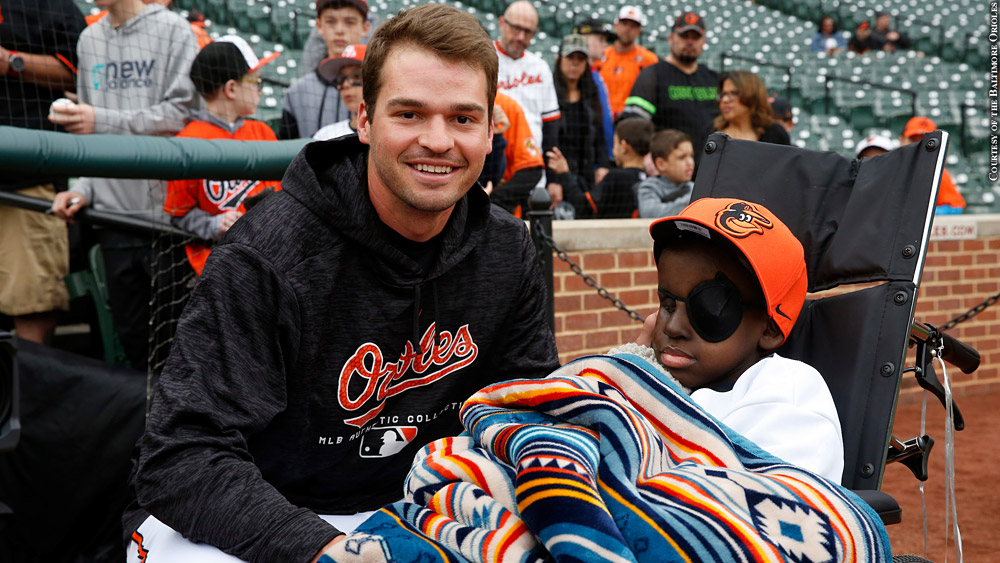
PB: Did you get to spend much more time with him? It’s a weird feeling because obviously you’re going through what you’re going through and he’s sadly in the final weeks of his life.
TM: And we both had to be careful, too, about COVID, so the day of his parade for his graduation, we went and brought him some Chick-fil-A and got to see him a little bit, but there were a lot of people around. We talked for a good 15, 20 minutes about a bunch of different things there, and I went back up a couple weeks later to just spend some one-on-one time with him. And that’s a day I’ll always cherish, getting to hang with him. We watched “SpongeBob” and played video games, played “Wheel of Fortune.” It was a really fun day, just getting to hang with him and spend some one-on-one time with him.
PB: What was it like to have to go through all the treatments and go to Johns Hopkins Hospital during COVID? What kind of awareness did that give you about what the nurses and the doctors are going through?
TM: I don’t know anything different than going through chemo during COVID. Going there by yourself, it can be tough, especially on the drive home. We were living in D.C. throughout the time that I was going through chemotherapy, and by the time that I had gotten back to D.C. was really when it hit me. I got tired. I started feeling pretty nauseous and stuff. The ride back was always pretty brutal because I knew it was going to hit me by the time I got back to D.C. That’s something I definitely don’t miss. I cannot say enough about the nurses that took care of me throughout all this and my doctors, my surgeon and my oncologist. What they’ve done for me and what they do for everybody else there is incredible. They really are sacrificing their lives to be there during this pandemic. It’s just such a crazy time, and so many protocols have to be taken but for good reason. The people on the front lines deserve all the credit in the world and more for what they’ve done this entire time. They’re a huge part of helping me get through it, too. I’d say overall I handled everything pretty well and got through it, but that’s because of the people around me, and that especially includes the doctors and nurses.
PB: Did the doctors and nurses really stress to you that you had to be more careful than a 28-year-old who’s not in a cancer battle?
TM: Definitely, because [with] chemotherapy your platelet counts are going to drop. Your white and red blood cells definitely are lower, and you’re more susceptible to contracting the disease. They told me from the start I had to buckle down and not do much, basically just stay in the apartment and go for walks, especially adhere to social distancing protocols. I did that, I feel like, really well the entire time. It was tough, especially when you’re going through chemotherapy and stuff. When you’re feeling good, you want to get out and do stuff, but it’s kind of tough to have to adhere to all that, but I definitely knew that’s what I needed to do.
PB: What was it like having to do chemo by yourself? I think that the feeling of isolation is something a lot of people have felt during this year, and you’re a wildly popular athlete who people would love to spend time with and be around. Did you feel any of those feelings of isolation, having to do chemo by yourself, and how did you work through some of that?
TM: To tell you the truth, I didn’t too much. The time went by relatively quickly given that I was there by myself. The Michael Jordan documentary was airing during the time I was getting my treatment, so on my Mondays I’d watch those episodes. I’m obsessed with “The Office,” so I had a book just all about “The Office” and little-known facts about it. I’d read that and before I knew it, the three hours were up and I was out of there. To tell you the truth, the time passed relatively quickly given where I was. I kept busy in there. It’s not like I sat and stared at the wall and felt sorry for myself the whole time. I tried to keep busy and entertain myself while I was there.
PB: When you did the Players Tribune piece, you used the word “lucky.” I think a lot of people would be fascinated that someone who went through what you’ve gone through would consider himself lucky. It’s been a brutal year for a lot of people. Why do you feel lucky having been through everything?
TM: Because if I didn’t play for the Orioles or didn’t play baseball, I wouldn’t have ever, ever gotten a blood test. I didn’t have any other [symptoms] that would’ve told me I have colon cancer, so the cancer would’ve progressed, plain and simple, to stage 4. When you get diagnosed and it’s a metastatic disease, your chances are not too good. I felt extremely lucky that we caught it when we did, even though it was stage 3 and I needed chemo. That obviously wasn’t ideal, but also on the flip side of things, I wanted to look at it from a glass-half-full perspective and know that without that, I wouldn’t have known until it was really, really far along.
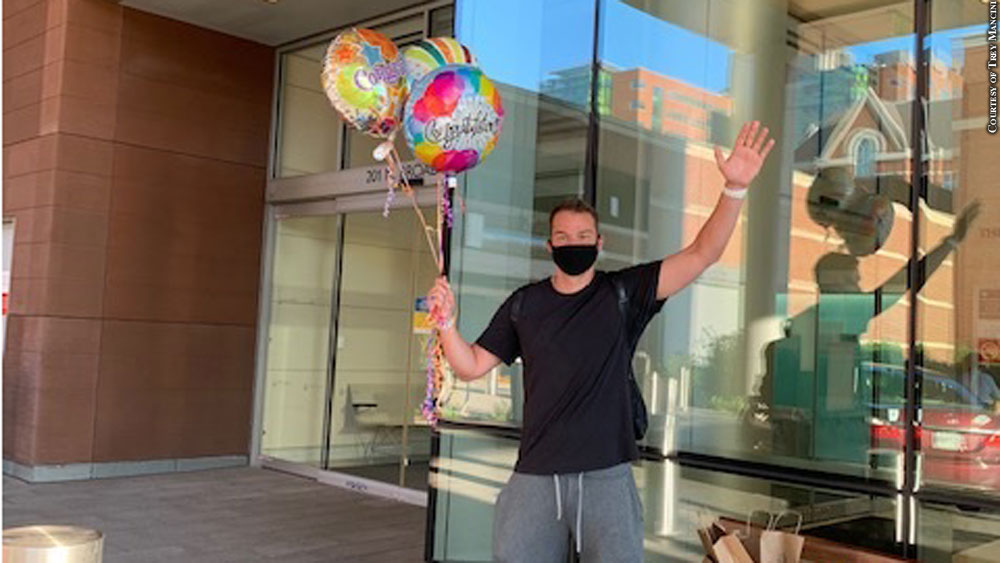
PB: Can you describe what the last day of chemo was like for you? What was the range of emotions you felt?
TM: It was a long day. That day I got scanned. I had a blood test. I had all the tests to kind of give a marker of where I was at the time. Pretty nerve-racking because it’s your last day of chemo and you’re happy about that, but on the flip side, you want your test results to come back good and be off to a good start to getting back to normal. It was a nerve-racking day, but the scans and everything came back looking really good. Two days after that, whenever we unhooked [the port from the take-home pump] for the final time, was a really great feeling, and then the day after that. Thursday, Sept. 24 was when I got my port taken out, and then that especially felt good, even more so than the last day of chemo, getting the port out, even though you get used to the port being in there. Getting that out was really symbolic of being done with the chemotherapy and was a pretty cool feeling.
PB: It strikes me in having this conversation that it feels very matter-of-fact for you. It feels like, “Yup, this was my year, these are the things that I went through.” Was there a point at which it wasn’t as matter-of-fact? Did you find yourself more vulnerable during the course of the year, where it wasn’t as easy to say, “OK, this is the next appointment, this is the next thing I have to do?”
TM: Yeah, for sure. It’s so easy to get caught in a rabbit hole of going online, researching colon cancer success rate of people at my stage. You look up all this stuff, and some of it can encourage you, some of it can really get you down and it’s scary. There are still some days, especially now it’s just kind of weird being done. Like I said, you kind of look back and it all hits you. Like, what the hell just happened to me this year? There’s always a little bit of uneasiness knowing that you still have to go through checkups and it’s a part of your life now. So yeah, there were definitely some times where I got down and scared because I want to live a long time and have a long, happy life. Getting this disease is a very scary thing.
PB: What was your relationship like with baseball as you were going through all of this? Was it difficult for you to watch and interact with the guys, or did it give you a newfound love and appreciation for the game?
TM: It definitely did. I kept in touch with the guys a pretty good amount. I was hoping to get up to the park some, but obviously with COVID, that couldn’t happen. So it was weird kind of being on the sidelines and just watching the game on TV and not exactly being part of the team, and you really miss that throughout all this. I always enjoyed the camaraderie and seeing the guys every day, and I really missed that this year, so it was definitely very strange to kind of be on the sidelines this year.
PB: Did you talk to any other cancer survivors during the course of the year in the baseball world? In a way, you kind of represent an entirely different group of people now moving forward. Did you talk to any of those guys about going through this and your role now in representing cancer survivors?
TM: Rick Sutcliffe called me early on right before I started chemotherapy. I talked to him for a while. That was great to hear him. He told me his experience. That was the thing that helped me the most I think throughout this was talking to other people who had been through cancer, especially colon cancer, so I would know what to expect. To hear other people who got through the chemo and came out better on the other side and have had no problems since, it’s always good to hear those stories, to kind of give you hope and push you along. When you’re two or three treatments in out of 12, it seems like it’s never going to end. So talking to people like that helps so much.
PB: You obviously have been a leader on this team and in this community for a while now, but specifically representing cancer survivors, have you felt that already? Have you heard from people that it means something a little bit more that this is who you are?
TM: It definitely changes you in a way. It gives you a much different perspective on things. It’s the most life-changing news that you can ever receive, so I hope from this point forward to be an advocate for anybody that gets a cancer diagnosis, that they can talk to me and use my story as inspiration, I always hope to do that. But without [my girlfriend, Sara Perlman] and my family and my friends, I could have never gotten through this like I did. It would’ve been so much harder. Sara was there helping me literally every day. I can’t even tell you how much she did and put her life on hold for me these last six, seven months. So to have someone like that by your side the entire time makes it way easier. I am so lucky to have had her and such a good family and support group.
PB: Getting back to baseball, does what you’ve been through give you more perspective on what the Orioles are going through right now in terms of an extensive rebuild?
TM: Definitely. Sometimes, you just unfortunately have to roll with the punches. We had a couple of pretty tough years in there as a team kind of starting with September 2017. That’s really when it started to go downhill a little bit, but you’ve got to keep plugging along and get through those times. Going through what I did definitely puts things in perspective, because I hate losing. I really do. I hate not doing well. But after going through this, I realized having your health and having a great family and people around you are the most important things in life. It’s easy to say that, but now I really feel that and can appreciate that, I think. Before, I sometimes would get a little too mad after games if things didn’t go too well — maybe didn’t handle failure as well as I could’ve at times. I think I’ve got kind of a fresh perspective on all that now. I feel like I can use that going forward.
PB: You’ve played for two managers during your MLB career. Can you talk a little bit about the differences between Buck Showalter and Brandon Hyde?
TM: They’re definitely a little different in their managerial style, and they’re two people who I’m very close with. I really am. Buck checked in with me a lot. Both of them. Hyder, too — of course I talk to him a lot. I got to see him one day early on right after my diagnosis. I can’t say enough about both of them. Buck, A, for kind of having faith in me in 2016 — we’re in a playoff race and he had faith in me, put me in the lineup and believed in me to contribute to the team. From then on, he always depended on me and expected a lot out of me. I feel like it was such a great start to my career to play for a guy like that. I’m so appreciative for getting to play for a guy like that. You can’t say enough about him. And Hyder, I think he’s done such a great job since he became our manager from Day One. I remember his opening speech, it was just all about clubhouse camaraderie, being there for the guy next to you. And we did that before, don’t get me wrong. The group that was there when I got called up was amazing. They had such a good core group of veteran guys. But when Hyder came in, we were all young. I think I’m the second-most tenured guy on the team now, which is crazy to think about, but I think Hyder’s done such a good job with our group of teaching the guys how to be cohesive and hold each other accountable. I think our team’s grown a lot since February 2019 when we got to spring training. I think we’ve all taken the words that he said to heart, and I think it showed a lot this year when you look at the group that was out there in 2020. They did such a good job, by and large, and proved a lot of people wrong even though they ultimately fell short of the playoffs. I was so proud of the guys and the way they played and carried themselves this year. That’s all a testament to Hyder.
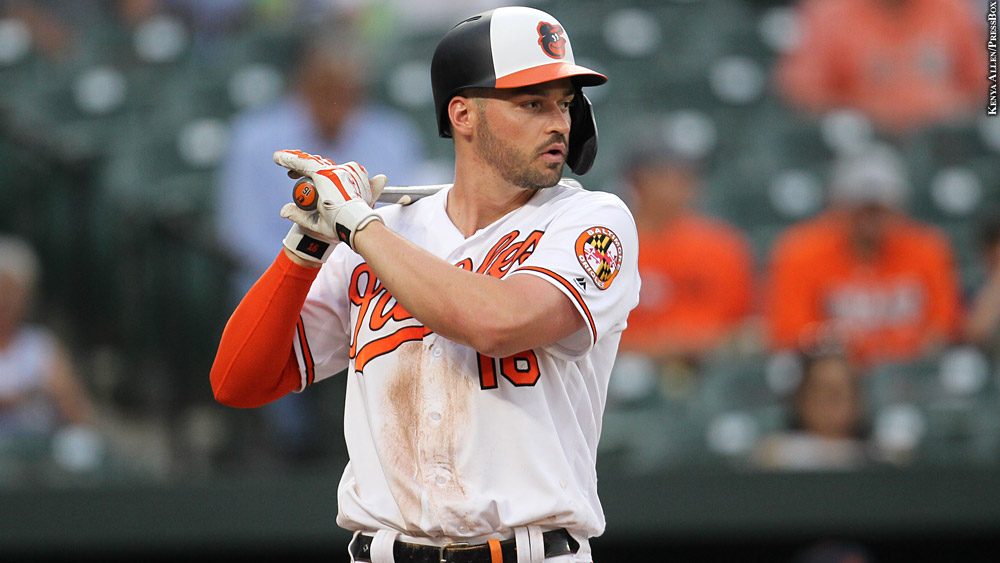
PB: As far as your progress, are all systems go moving toward 2021?
TM: Oh, yeah. I’m like full tilt, no restrictions or anything. Luckily I didn’t really lose much strength, somehow, throughout chemotherapy. When I’m working out, I basically feel like I did before. I feel ready to go now.
PB: You always hear athletes talk about what the fans mean to them, and it can come off as saying what they’re supposed to say. But you have such a unique relationship with this city and have taken on the role of being the face of the franchise as it’s gone through this transition. Did you feel that special relationship with the fans and city while you were going through everything?
TM: Definitely. I can’t even explain what it’s meant to get all the support I have from the fans. I get so many messages, I get so much mail, and you want to respond to everything but it’s almost impossible to do that. Everybody that’s reached out to me, I want them to know how much it means to me and it helped me get through the toughest time in my life. Everybody rallied around me and my family throughout this whole process. They’ve always been such great fans through the thick and thin. That especially rang true this year.
PB: When someone dies, we often say, “We’re going to take them with us for forever,” right? That feels particularly important when it comes to Mo and wanting his story to be known forever. How much of an obligation do you feel, because people associate you so much with Mo, to be someone who carries his legacy, and have you thought about what that might look like moving forward?
TM: I always want to carry his legacy. In 10 years, I want to tell people about Mo, and I always want him to be remembered. I feel so lucky to have even met him, much less be his friend. Somebody like that is somebody you want to emulate, and you want to make them proud every day. That’s what I hope to do. I’d be remiss without mentioning this, too. Actually one of my college teammates and friends, [Ricky Palmer], just passed from brain cancer as well. I was in Chicago for his service [the weekend of Oct. 24-25]. He’s just such a good, loyal friend. Every time I went and played the White Sox in Chicago, he was there. Losing him was really tough on me, too. I lost two great friends this year. I hope to honor and carry both of their legacies on as long as I live.
Illustration by John Pennisi
Photo Credits: Courtesy of Trey Mancini, Courtesy of the Baltimore Orioles, Kenya Allen/PressBox

